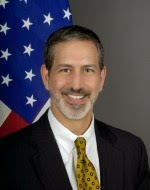- Public Policy
- Leadership
- Funding
- News & Events
- About the Center
Back to Top Nav
Back to Top Nav
Back to Top Nav
Back to Top Nav

Jonathan Shrier ’85, deputy coordinator for the U.S. Feed the Future initiative, visited campus last week to speak about the Obama administration’s commitment to tackling global food security. In the wake of the 2008 food crisis that triggered riots in over 30 capital cities worldwide, donor nations are turning their attention to agricultural development, an issue that had long been neglected on the international community’s agenda.
From a policy standpoint, what stood out most to me was Shrier’s emphasis on Feed the Future’s “whole of government” approach—meaning that it combines the efforts of various agencies. I have long viewed U.S. domestic agriculture interests as in conflict with the local development of agriculture in developing countries. Poor countries serve as an outlet to which the U.S. can sell cheap subsidized grain, making it difficult for local producers to compete. This practice, known as “dumping,” didn’t enter the global trade lexicon until relatively recently—an indicator of how for so long, it was seen as perfectly acceptable to keep the developing world dependent on food imports, supposedly because their agriculture was “inefficient.” Yet the renewed U.S. commitment to smallholder agriculture in Africa is a sign that these farmers are indeed legitimate producers of food for their own countries.
In Feed the Future’s inter-agency effort, then, it will be interesting to see whether the Office of the U.S. Trade Representative adjusts its policies to be more compatible with the interests of developing world farmers. If the Office continues promoting U.S. exports into Feed the Future focus countries, it be contradictory to the initiative’s goal of supporting locally-based production in those countries. A commitment to addressing food security means not just supporting farmers’ productivity, but creating the enabling environment for those farmers to gain market access—and U.S. trade policy plays no small part in that equation. One of the key highlights of Feed the Future is its explicit focus on nutrition.
The 1960s “Green Revolution” led to vast productivity increases for carbohydrate-rich staple crops in India and Latin America, but at the expense of the cropping diversity needed for healthy diets. Feed the Future puts an emphasis on nutritious crops such as fruits and vegetables, and enhances capacity of country-level nutrition agencies. This importantly marks a shift away from the Green Revolution ideology that promotes merely food sufficiency, and not nutritional adequacy. In fact, when I visited smallholders in Kenya last year, I observed farmers shifting from maize production to cassava and sweet potato, to improve nutrition. The challenge is to develop markets for these crops to expand access for urban consumers, many of whom rely on cheap grains.
--Dan Bornstein '14, Guest Writer for the Rockefeller Center